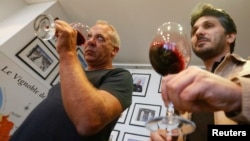Amid the war in Syria, one hillside vineyard still produces wines that are served in the Michelin-starred restaurants of London and Paris.
It has been a struggle to keep Syria's last commercial vineyard open, the owner of Domaine de Bargylus says. The war, which started in 2011, has engulfed the whole country, and militias on both sides fight in every province.
Sandro Saade and his brother Karim, Christians with family roots in Syria and neighboring Lebanon, planted grape vines on the tree-lined peaks of the Mediterranean province of Latakia in 2003, two millennia after the Romans used the same slopes for their own wineries. Bargylus' first vintage was in 2006.
Syria's rebel forces - a mixture of hardline Islamists and other groups seeking to end the dynastic rule of President Bashar al-Assad - are in Latakia and started taking ground last year. Some of these groups have forbidden alcohol in areas they control but Bargylus vineyard has stayed in government-held territory throughout the conflict.
Syrian wineries were largely small-scale operations, often located at churches and monasteries and meant for local consumption. Syrian Christians made up 10 percent of the pre-war population of 22 million people, but that figure has fallen sharply amid the violence, and wine production has dwindled too.
There have been a few scares at the Bargylus winery. Last August, Assad's forces and rebels battled clashed about 100 meters from the farm. Several explosions hit the vines, but there was minimal damage and the fighting has since retreated.
“We've been lucky that the conflict is not very close,” Sandro Saade said from Lebanon's capital, Beirut. “Compared to other regions of Syria, we haven't had the conflict permanently installed next to our properties.”
Taxi Ride
Still, the war forced the Saade brothers out of Syria, as it has millions of other refugees, so they now manage the vineyard remotely from Beirut, 200 km (125 miles) away.
The Syrian staff have stayed throughout the fighting and pick, ferment and bottle the wine on site.
During the summer, close to harvest, a sample of grapes are delivered twice a month to Beirut, where they are tasted by Stephane Derenoncourt, a French winemaker and consultant, who has worked with the Saade brothers since the establishment of the vineyard.
The six-hour taxi ride carries a sample of red Syrah, Merlot and Cabernet Sauvignon grapes and white Chardonnay and Sauvignon Blanc grapes through the border to Lebanon for tasting.
“It is a risk [to visit Syria] because of the war,” Derenoncourt said at the tasting session with Saade in Beirut. “I used to go five or six times a year.”
Even as the conflict spreads, the winemakers are determined to keep the vineyard open.
“The quality of the soil is fantastic because we have two different soils ... It's very good for the production of wine,” Derenoncourt said.
At the tasting, Derenoncourt sampled the grapes for bitterness and crushed the reds in his hands to check the skin. The reds were about two weeks from harvest, the whites only a week away, he said.
The major challenge of running a vineyard from another country in a time of war is logistics, Sandro Saade said.
Around 45,000 bottles are boxed in Syria yearly but then travel by sea to Egypt, then on to Lebanon, eventually arriving in Antwerp to be stored in their European warehouse.
“We're trying to do whatever we can. Getting a taxi from Syria to here is not always easy. A week ago, we wanted to taste the grapes for the first time this season and the taxi couldn't go through the borders because the borders were closed,” Sandro Saade said.
Bottles that make it out are sold to fine-dining restaurants that include L'Atelier de Joel Robuchon, Gordon Ramsay's Claridges and the Dorchester Hotel.






